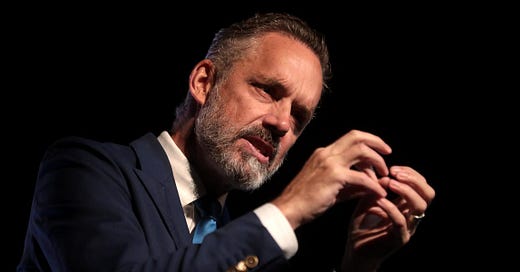Angels are ubiquitous. At Christmas, we put them at the top of our trees; when our relatives die, we often adorn their graves with them; and the visual arts and music are replete with representations and invocations of these mysterious and Godly spirits. From Andrei Rublev to John Milton, to William Blake, Paul Klee, and Robbie Williams, they have preoccupied the minds of history’s great and not so great artists and thinkers. Each of the three main Abrahamic religions—Judaism, Christianity, and Islam—has a place for them.
I began thinking about angels over the holiday season after watching Frank Capra’s magnificent Christmas film, It’s A Wonderful Life (1946). There, the film’s suicidal protagonist George Bailey is visited by the dim-witted but well-meaning Clarence, his guardian angel. At a moment when George is caught in the depths of self-resignation and despair, Clarence seeks to show him just how significant his life has been and the importance of his continuing to live it.
In the Christian tradition, angels have been assigned two distinct roles. On the one hand, they are adorers of God, like the six-winged seraphim who circle God’s throne proclaiming his holiness. On the other, they are messengers or interveners, concerned with doing God’s work on earth. Clarence, clearly, is a messenger. His message, however, is delivered bluntly. Lacking the acuity of his angelic peers, he simply shows George the world as it would be if he hadn’t been born, and it is not—arguably—a pleasant place.
Many of us believe we’ve been visited by angels. Few, however, I imagine, would recognise George Bailey’s encounter. On the contrary, for the most part, angels are playful and ironic. They are not forthrightly didactic. Immensely skilled pedagogues, they do not hector, but subtly instruct by hints and allusions, bringing their students’ to self-knowledge gradually. It is a second Christmas film, which you probably haven’t seen—first screened a year after the release of Capra’s masterpiece, sharing, however, little of the latter’s subsequent esteem—namely The Bishop’s Wife directed by Samuel Goldwyn, where angelhood is properly depicted.
The Bishop’s Wife is about an unhappy yet almost saintly woman, Julia Brougham, married to a vain and self-interested Bishop, who is obsessed with raising the money to build a Cathedral in his diocese. Resigned to flattery, kowtowing, and begging the local rich for funds, always unsuccessfully, the Bishop lives in a state of perpetual angst and frustration. So thoroughly self-absorbed, accordingly, he neglects his wife and child and spreads misery wherever he goes. One evening, he prays to God to help him, and the suave and handsome Dudley duly arrives.
Dudley, played by an impeccably well turned out Cary Grant, is a splendid angel. Although he reveals himself to Henry, the Bishop, he is not Henry’s guardian angel; he is Julia’s. He succeeds in changing Henry’s behaviour, and thus, by implication, restoring Julia’s happiness, not by directly showing Henry the error of his ways but by making Henry jealous. With good reason, the Bishop fears that Dudley is intent on stealing his wife. The film is chock full of the accoutrements of historical angelhood—light, fire, symbolic halo’s, wings, and even a harp—but Dudley, in contravention of his angelic duties, is not beyond temptation; indeed the more time he spends with the Bishop’s wife, the more contemptuous he becomes of the Bishop, gentle, instrumental mockery slowly turning into disdain.
Angels are capable of committing two sins, the sin of pride and the sin of envy. Dudley is guilty of both. He does not fall from grace, however, restraining his sinful impulses just in time. Dudley does not straightforwardly resemble any of the angelic archetypes in the history of Christianity—Michael the commander, Gabriel the messenger, Raphael the healer, or the angel who wrestles Jacob to test his strength and resolve. Rather, Dudley is an amalgam of the latter three, teaching people how to behave like human beings, assuaging Julia’s melancholia, and provoking the Bishop, finally, into saving his marriage.
Like many people uncontaminated by wokery and its certainties, I’ve had my own angelic encounters. I suspect, however, that these were mostly mere mortals who came bearing messages for me. There is one public figure, though, who continues to test my belief that these are profoundly unangelic times—the idea, that is, that we’ve created a culture so dogmatic and unthinking that real angels, if they do exist, just wouldn’t bother to engage with human beings, in the knowledge that whatever they said or did would not change a person’s mind. It occurred to me, at any rate, that Jordan Peterson, the Canadian psychologist and YouTube guru, might, in fact, be an angel, not a mere guardian angel, either, but an archangel, higher up in the heavenly hierarchy.
Sure, Peterson is more imperious than Dudley, who is almost unstintingly good-humoured and relaxed. Quick to defend himself when under attack, it is impossible to imagine Peterson humouring the Bishop, for example, for the duration of time that Dudley does. Equally hard to conceive, however, is that Peterson might sleep with your wife. He may be a tad priggish—too priggish to be a guardian angel—but Peterson is sincere. He may admire the successful lobster, high on serotonin, but he does not think we ought to emulate the feisty crustacean in every respect. If Nature has its place in human society, so, too, does Grace. Peterson, in other words, does not have ulterior motives. Moreover, the self-help heuristics both he and Dudley employ in conveying God’s message on earth converge in important ways.
The first of Peterson’s twelve rules for life is: “Stand up straight with your shoulders back.” Don’t allow yourself to be dominated, he counsels, by adopting the comportment of the dejected and submissive. When Henry concedes in The Bishop’s Wife to the conditions set by his wealthy patron before she will fund the construction of the Cathedral he so craves, conditions which turn his sacred endeavour into something profane—a vanity project to honour her late- industrialist husband—Dudley makes it impossible for the Bishop to follow Peterson’s advice. When the Bishop rises from his chair, he finds himself stuck, literally unable to stand up, except in a contorted fashion. Dudley sees to it that a man who refuses to behave in an upright way, who fails to say what he thinks and do what he knows is right, cannot stand upright, either.
Similarly, Dudley attempts to help the Bishop help himself, paralleling Peterson’s second rule for life (“Treat yourself like you are someone you are responsible for helping”). The Bishop can improve the world by improving himself first, he suggests, for at present he is incapable of bringing glory to God’s name, only shame, proposing to build a Cathedral in the midst of an economic depression. Julia could also take some responsibility, however. She, surely, could learn a thing or two about standing up for herself and forging relationships with people who want the best for her (Peterson’s third rule). But The Bishop’s Wife was made in 1947, long before second-wave feminism; angels are less sexist now—less sexy, too, if I’m right about Peterson (although the angelry is, it seems, diverse if my own experience is anything to go by).
Dudley is certainly charismatic and seductive in a wholesome kind of way, but he does not actively tempt Julia into compromising her marriage. He is an angel, not a demon. He has nothing in common, for instance, with the decidedly sultry angel-cum-demon figure played by Terence Stamp, who deliberately seduces each member of the sexually repressed bourgeois family he visits in Milan, in Pier Paolo Pasolini’s ambiguous and complicated film, Teorema (1967). As with Peterson, a clinical psychologist, the talking-cure is Dudley’s main instrument of reform. For The Visitor in Teorema, it is his crotch. Now, Pasolini may or may not have wanted us to accept the idea that it is promiscuity that sets us free—that Rimbaud forms the cornerstone of the good society—but what is clear is that The Visitor is not an angel.
Angels prompt, pester, and provoke human beings into self-help; demons tempt human beings into self-harm. Angels have staying power—they persevere with the delivery of their message for as long as is necessary—demons disappear when it suits them. While Dudley is subtle and committed, The Visitor in Teorema is cajoling and erratic. He judges himself finished without observing the results of his work, and we are expected to condemn the bourgeois family as avaricious when they each mourn the loss of their guest and the feelings of intimacy and meaning he generated.
It is, needless to say, Pasolini’s world now. Mainstream contemporary culture is demonic—implicitly (think universities providing “training” for sex work or the omnipresence of violent pornography) and explicitly so (consider the reception, for example, recently afforded to the Satanic Temple by sections of the post-Christian elite). And if it is not demonic, it’s authoritarian. It seeks to intimidate people into submission to an illiberal and homogenising status quo, changing minds by denunciation and compulsory re-education. Peterson is exceptional in his commitment to an alternative worldview, which eschews the chaos and nihilism of twenty-first-century liberalism with its open-ended invitation to injure ourselves in an ingenious variety of ways. He is also exceptionally resilient, refusing to succumb to the pressure of those who seek to caricature his message as misogynistic and racist.
Peterson may not get everything right. He is notably uncritical of the neoliberal model of capitalism, for instance, with its ideal of meritocracy. Unlike Dudley, whose membership of the heavenly host cannot be doubted, Peterson does not strongly censor Economic Man. Similarly, he deemphasises the role of economic and political structures in peoples’ lives to an unreasonable extent. But, then, maybe Peterson’s just biding his time? Maybe he’s waiting for the first half of his message (“Set your house in perfect order before you criticise the world”) to properly sink in before he expounds a further set of “left-leaning beliefs” to those set out in 12 Rules for Life to bring his philosophy fully in line with the socialistic impulses of Christianity? Or, perhaps these are unangelic times, after all, and Jordan Peterson is not an angel sent to earth by God to prevent western civilisation from destroying itself?
I hope it’s the former—I hope that angels have not given up on human beings despite the insouciance they encounter and the hostility they face.
Another 12 Rules for Life, please, Dr Peterson.






I wasn't expecting the witticism in this piece. It was, I thought funny, generous and simultaneously thought provoking. Long live Savage Minds! Thank you for this piece.